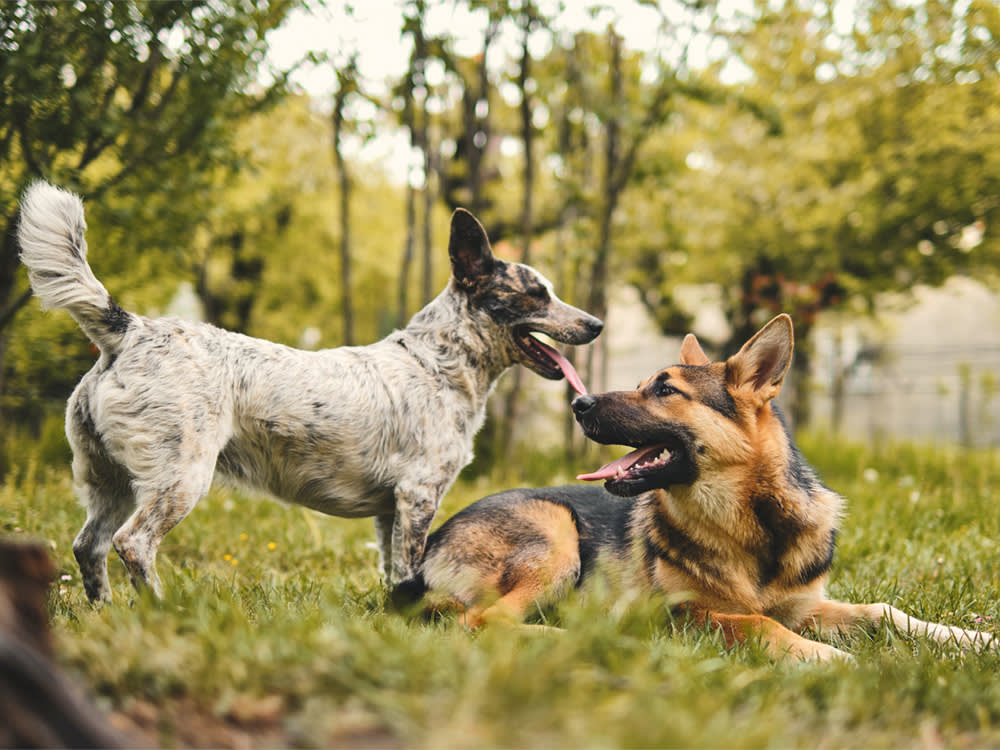Your Dog is Smarter Than You Think
Dogs have the ability to understand much more complex things than you give them credit for.

share article

Your pet wants you to read our newsletter. (Then give them a treat.)
How is dog intelligence measured? We know bigger dogs, with larger brains, perform better on executive functioning — like short-term memory and self-control — than their smaller breed counterparts. But a dog’s brain size does not seem to be associated with all types of intelligence, particularly social and emotional reasoning. According to some dog cognition researchers, the average intelligence of a dog equates to that of a toddler (around two years). But there are plenty of ways a dog excels beyond that level of understanding.
How intelligent are dogs?
The internationally renowned Hungarian scientist Vilmos Csányi studies dog intelligence and behavior at Eötvös Loránd University in Budapest, where he chairs the department of ethology. In his book, If Dogs Could Talk: Exploring the Canine Mind (translated by Richard E. Quandt), he talks about dog intelligence, the social and emotional bondsopens in a new tab between dogs and humans, and the idea that, by observing the cognitive behavior of dogs, we can also learn much about how the human mind works.
Rico, the Border Collie, made the news because he could differentiate the names of many different toys. “In my view, the Border Collie represents a very interesting case, suggesting that dogs indeed have the potential for fast ‘word’ learning. Of course, this does not mean that they could acquire language like children, but they might have some skills for recognizing the connection between a novel vocalization (“word”) and the presence of a novel object,” says Csányi.
On average, dogs are considered as smart as two-year-old children. Csányi says Rico’s word intelligence resembles that of a 14- to 16-month-old baby. “This is in general agreement with what dogs can achieve in other faculties of mind [relative] to human cognition. This study also hints that in the case of ‘talented’ individuals, with special training or ‘education,’ dogs can show an even higher potential for social cognition than has been appreciated so far.”
In one studyopens in a new tab, researchers sought to determine if dogs are similarly smart across multiple tests, like people. When people take IQ tests, they tend to perform at a similar level across various tasks. If they do well in one area, they’ll often do well in others. Researchers created a dog IQ test of sorts to test this theory on dogs with 68 Border Collies. The test included tasks like navigating barriers to get to the food, weighing the differences in quantities of food, and following instructions on the location of food. The results showed that dogs performing well on one test were likelier to succeed on another. Not all the dogs did equally well, so it’s clear that intelligence is based on the individual dog. How much of it is understanding languageopens in a new tab?
Then there’s Chaser. Chaser learned to differentiate at least 1,022 words — more than any other animal — most of which were related to toys. Throw in some basic grammar, her ability to categorize her toys by function and shape, and the start of imitative behavior, and you have one smart dog.
Chaser spent four to five hours a day working on enriching social and learning experiences. John Pilley and co-researcher Dr. Alliston Reid later published their findings and urged everyone to discover how smart their dogs really are.
Are dogs emotionally intelligent?
There have been suggestions that dogs and humans co-evolvedopens in a new tab. Is it because dogs also excel in emotional intelligence? Dogs have indeed acquired behavioral traits that have human analogs. “Dogs form an attachment relationship with their owners, and very likely (to some extent) with other members of their group, that resemblesopens in a new tab the way human children are attached to their mothers,” says Csányi. This emotional connection between dogs and people goes beyond family pets. “We have shown that even adult dogs [living in dog shelters] can very rapidly form attachment to humans [after only approximately 30 minutes of interaction]. The development of attachment between adults is again a human-specific trait,” asserts Csányi.
Gregory Berns, a neuroscientist at Emory University who uses functional MRIs to measure activity in the human brain, had long been a dog-lover, so when his family adopted Callie, a hyperactive Terrier mix, he naturally started to wonder what she might be thinking. This led him to consider how he might apply techniques used in his studies of the human brain to dogs. In the fascinating book How Dogs Love Us, he recounts the methods his team employed and how their pet dogs made some groundbreaking studies possible.
Training the dogs to maintain a sharp and steady focus as well as enjoy themselves while undergoing testing was key. An MRI machine requires the subject to remain perfectly still in a tightly enclosed space while being subjected to loud thumping sounds. Luckily, Berns found the perfect training partner in Mark Spivak, who was confident that positive reinforcement and clicker training could shape the dogs’ behavior so that they would freely and voluntarily maintain the required position. As it turned out, Spivak was right.
Initial findings showed evidence that dogs empathize with humans and have a theory of mind, and, by extension, that the idea that you must be your dog’s pack leader is a mistake. As Berns notes, “Callie was a sentient being who understood, at some level, what I was thinking and reciprocated by communicating her thoughts within her behavioral repertoire.”
Do dogs ask questions?
Questioning is very important in human group behavior because it shows interest in someone else’s thoughts. Do dogs have the ability to ask questions through vocalization opens in a new tabor other means? Yep, they do if you listen. “Young dogs also question us: Where do we go? Which way? Who is coming? Who goes down with me? Is it permitted? And so on. If people are careful and answer the questions, it can soon become a regular method of communication with the dog. If questions do not get attention, dogs give up, just like human children,” says Csányi. But it’s not a one-way street; you can also ask your dog questions and get their input on their likes and dislikes. “If I go for a walk with [my dog] at a crossroads, I frequently ask Which way? If I ask, then he carefully sniffs in both directions and selects the ‘better’ one, and starts to go. If I am not posing the question, then he just follows me.”
How can you exercise and enrich your dog’s mind?
“They are very much social animals, like humans, and depend in their development on continuous and variable social input from the environment. This means that they do not only need to be walked twice a day, but strive for substantial social interactions, which can take the form of play or joint sporting or even training,” says Csányi.
Your dog is your best friend, right? So treat them well. It isn’t an automatic process. You play a huge role in helping to shape your dog’s understanding of the world. If you want your dog to be smartopens in a new tab — with training, language, behavior, or emotionally — they’ll need your help to get them there.

Claudia Kawczynska
Claudia Kawczynska was co-founder and editor-in-chief of The Bark for 20 years. She also edited the best-selling anthology Dog Is My Co-Pilot.
Related articles
![a dog held on a leash sits calmly]() opens in a new tab
opens in a new tabDogs Who Are Easy to Train: Top 10 Easiest Dogs to Train
Spoiler: It’s not about the breed. But these pups are pretty brainy.
![A black dog holding its paw up to a woman's hand.]() opens in a new tab
opens in a new tab15 Amazing Facts About Dogs You Might Not Know
Boost your dog smarts with these cool facts.
![]() opens in a new tab
opens in a new tabHow I Got Through My Puppy’s Separation Anxiety Days
And survived the yowling, chewing, scratching, etc.
- opens in a new tab
Do Dogs Understand Our Words?
Say What? A look at the types of words that dogs understand.




